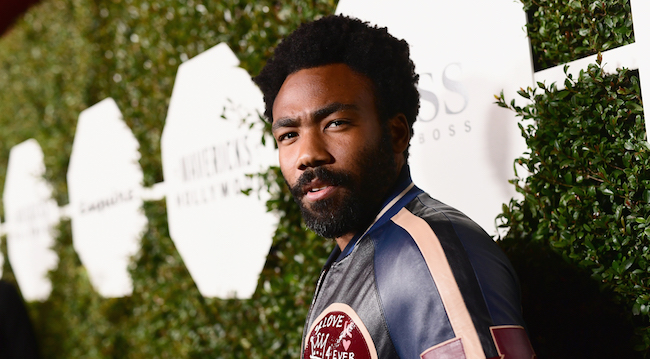
In a recent profile with The New Yorker, Donald Glover revealed his extremely zen method for dealing with racism in Hollywood, even when it was coming from his closest co-workers.
According to the profile, Chevy Chase, Glover’s Community co-star who came to the show with a widespread reputation of being difficult to work with, nevertheless found new depths of obnoxiousness in dealing with Glover’s increasing popularity as the show wore on. Community creator Dan Harmon pointed out how Donald never let it faze him, instead characterizing Chase’s antics as “almost too human.”
Chevy Chase, one of Glover’s co-stars, often tried to disrupt his scenes and made racial cracks between takes. (“People think you’re funnier because you’re black.”) Harmon said, “Chevy was the first to realize how immensely gifted Donald was, and the way he expressed his jealousy was to try to throw Donald off. I remember apologizing to Donald after a particularly rough night of Chevy’s non-P.C. verbiage, and Donald said, ‘I don’t even worry about it.’ ” Glover told me, “I just saw Chevy as fighting time—a true artist has to be O.K. with his reign being over. I can’t help him if he’s thrashing in the water. But I know there’s a human in there somewhere—he’s almost too human.” (Chase said, “I am saddened to hear that Donald perceived me in that light.”) Glover quit in the fifth season, too bored to do it anymore.
The story also covers his short-lived stint on HBO’s Girls — a role that was rumored to be a direct, damage-control reaction to accusations of the show whitewashing its New York setting. In a conversation with Girls creator Lena Dunham, Dunham reveals that Glover’s character’s rant after he was dumped was improvised, possibly coming from his own views about his use on the show.
The year that “Internet” came out, Glover appeared in two episodes of HBO’s “Girls” — cast, he suspected, to placate critics of the show’s lily-white sensibility. His character was Sandy, the black Republican boyfriend of Hannah, played by Lena Dunham. When Hannah broke up with him, Sandy began pumping his shoulders to imitate her privileged cluelessness: “ ‘Oh, I’m a white girl, and I moved to New York and I’m having a great time, and, Oh, I’ve got a fixed-gear bike, and I’m going to date a black guy and we’re going to go to a dangerous part of town.’ ” Dunham told me that Glover improvised his lines: “Every massive insult of white women was one hundred per cent him. I emailed him later to say ‘I hope you feel the part on “Girls” didn’t tokenize you,’ and his response was really Donald-y and enigmatic: ‘Let’s not think back on mistakes we made in the past, let’s just focus on what lies in front of us.’”
While tokenism and racism are no surprise, Glover’s even-handed responses provide one heck of a blueprint for ducking the drama. Even better, he’s getting his revenge through his tremendous success. Atlanta‘s second season follows an award-winning debut year, just months after a Grammy nomination for Awaken, My Love, and weeks before his star turn in Solo: A Star Wars Story. It looks like the former stand-up comedian is the one getting the last laugh.






